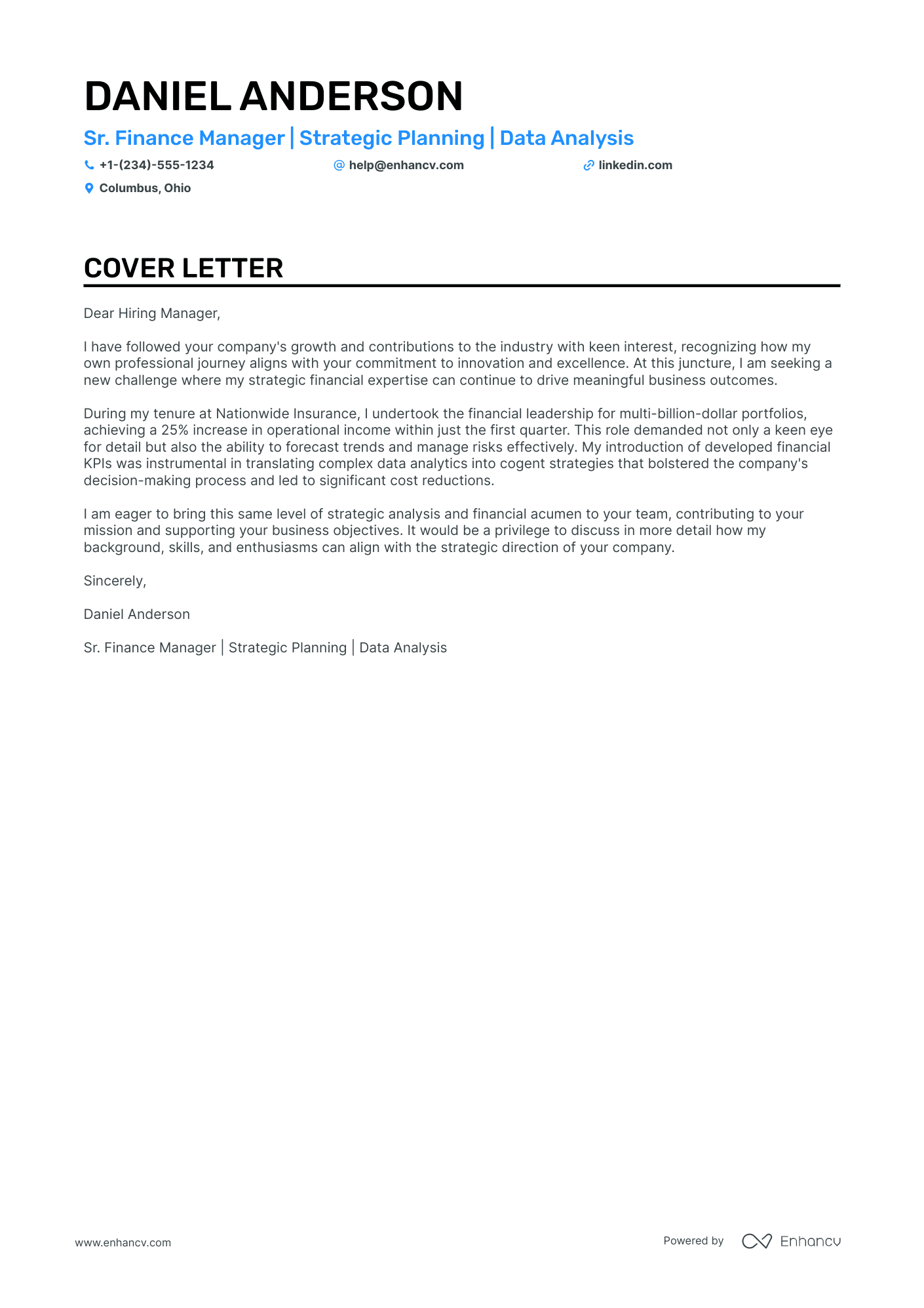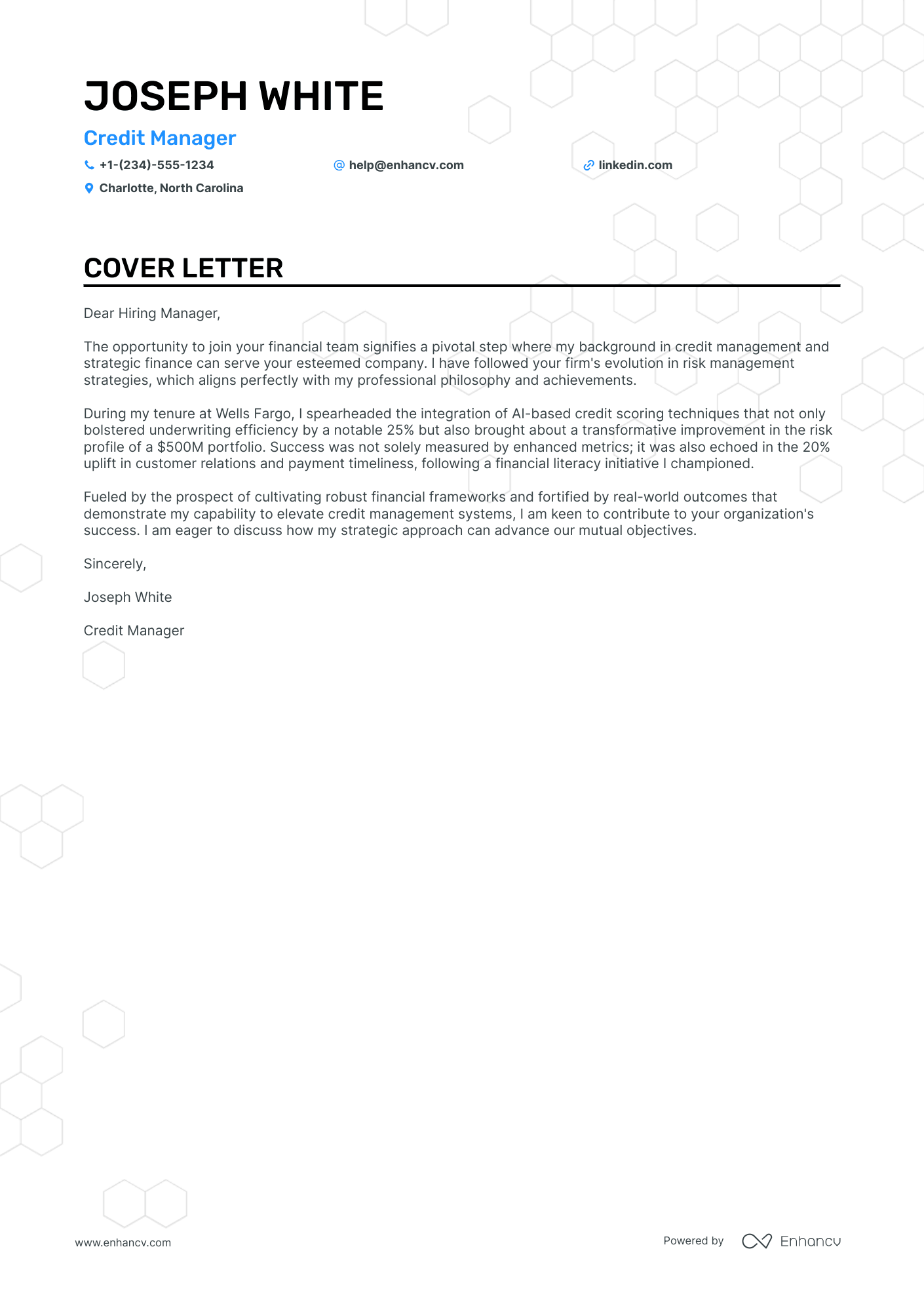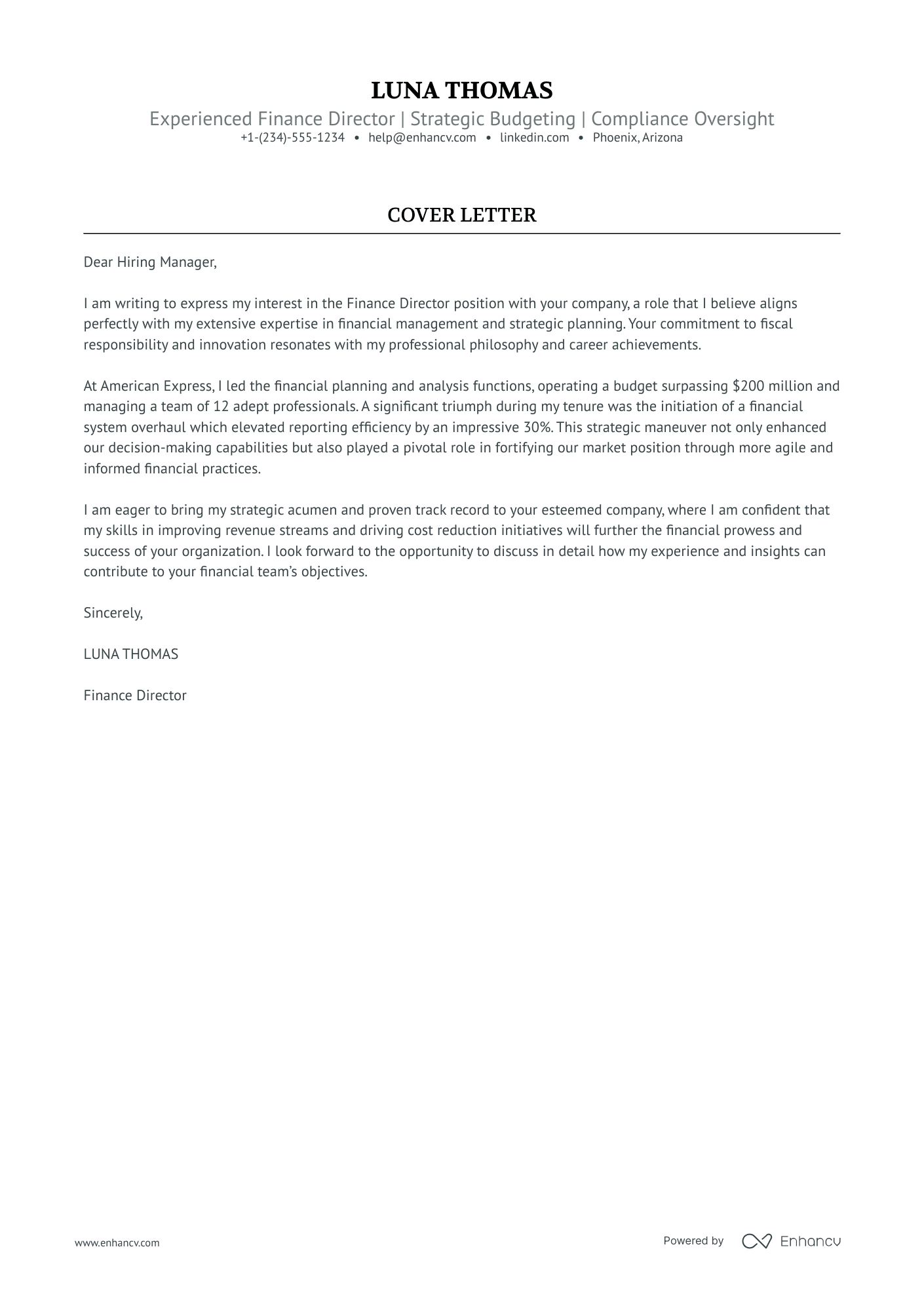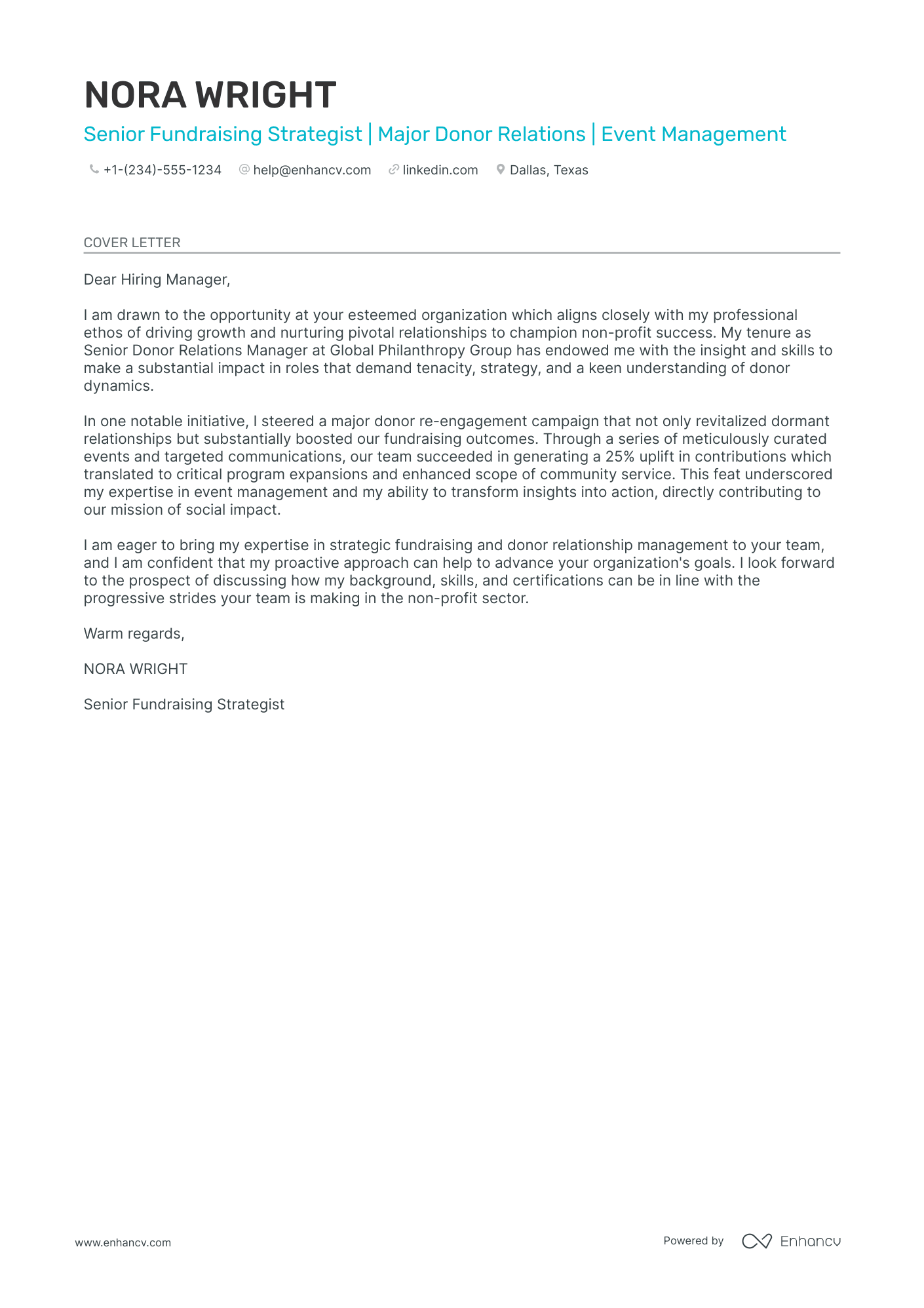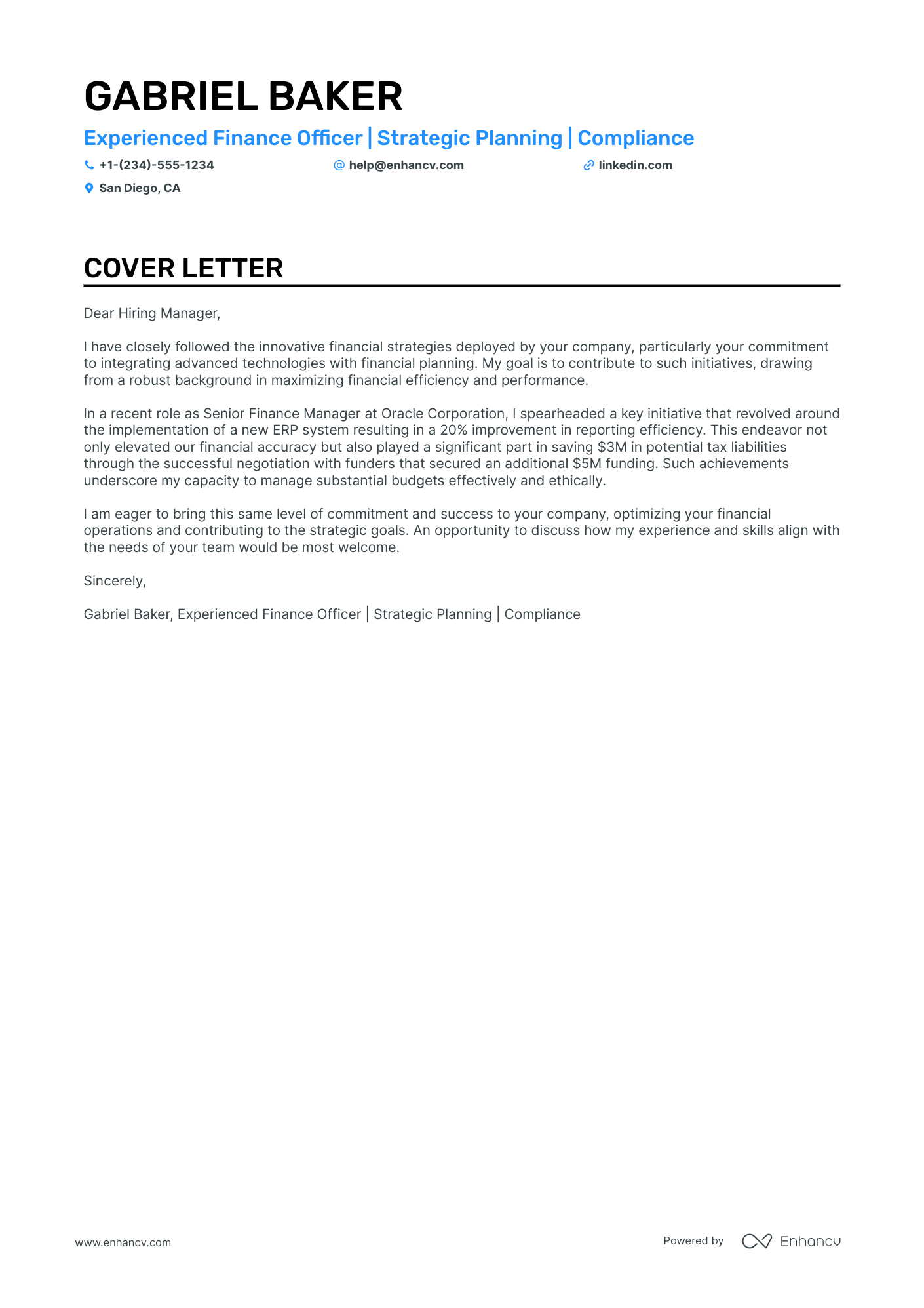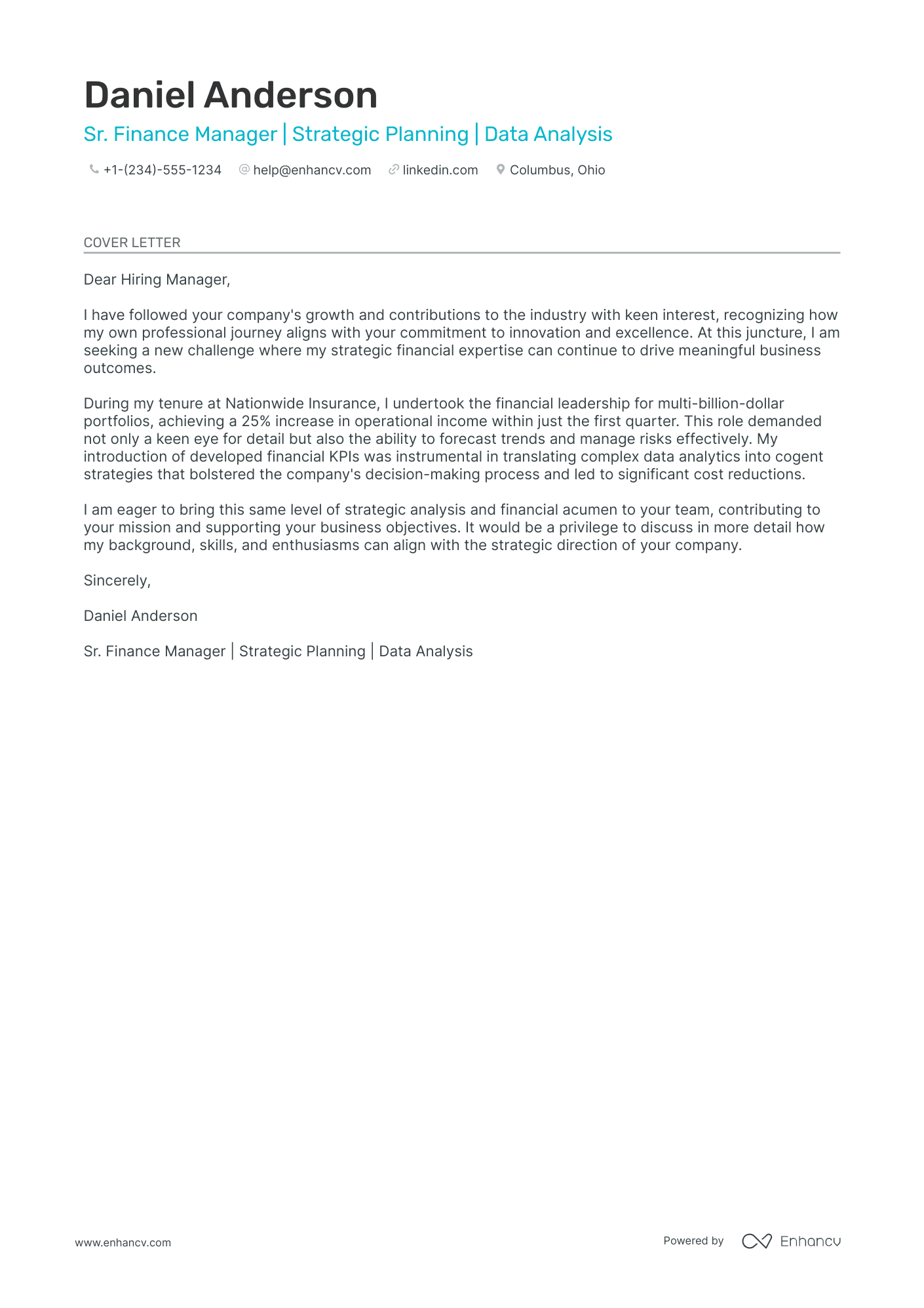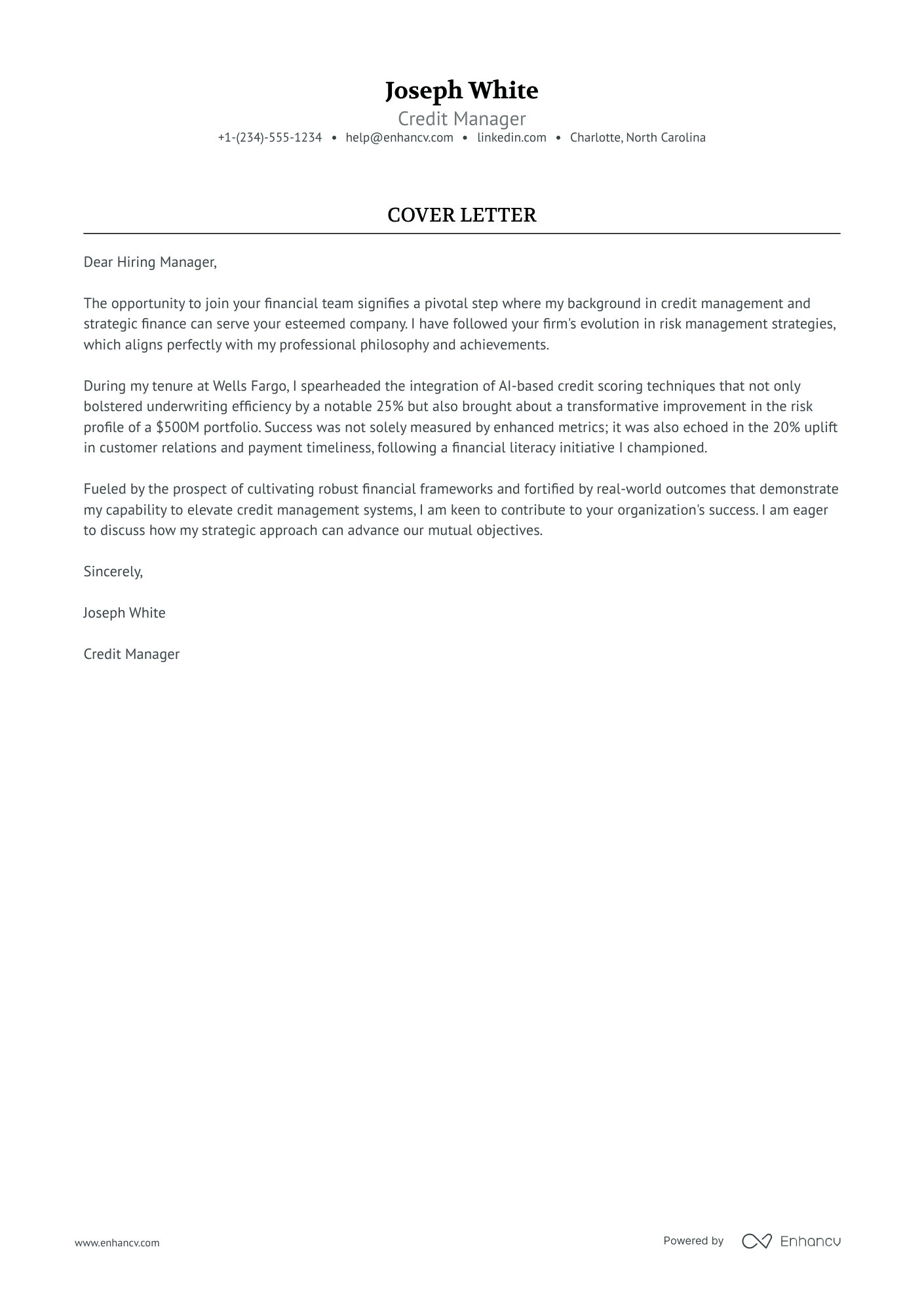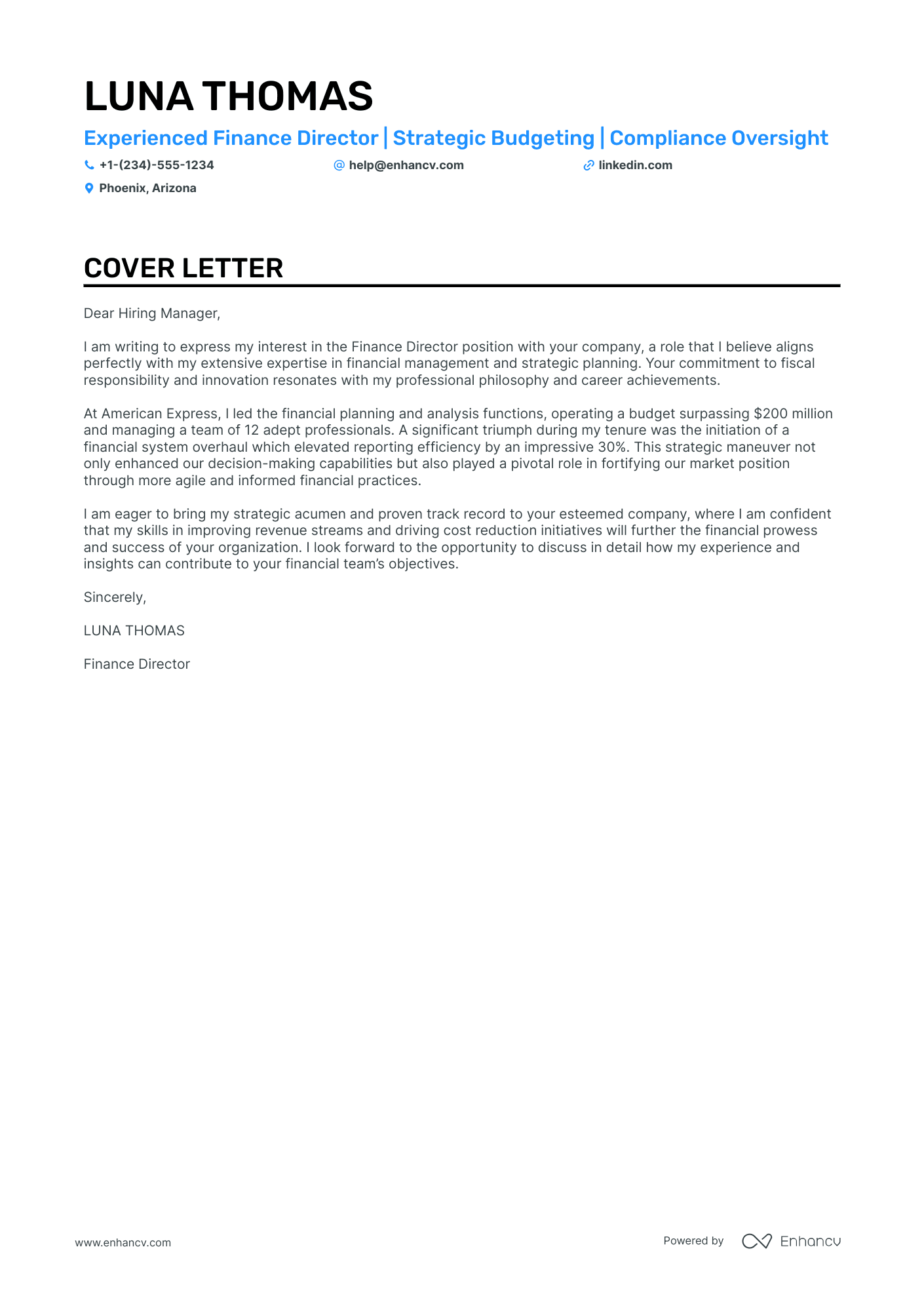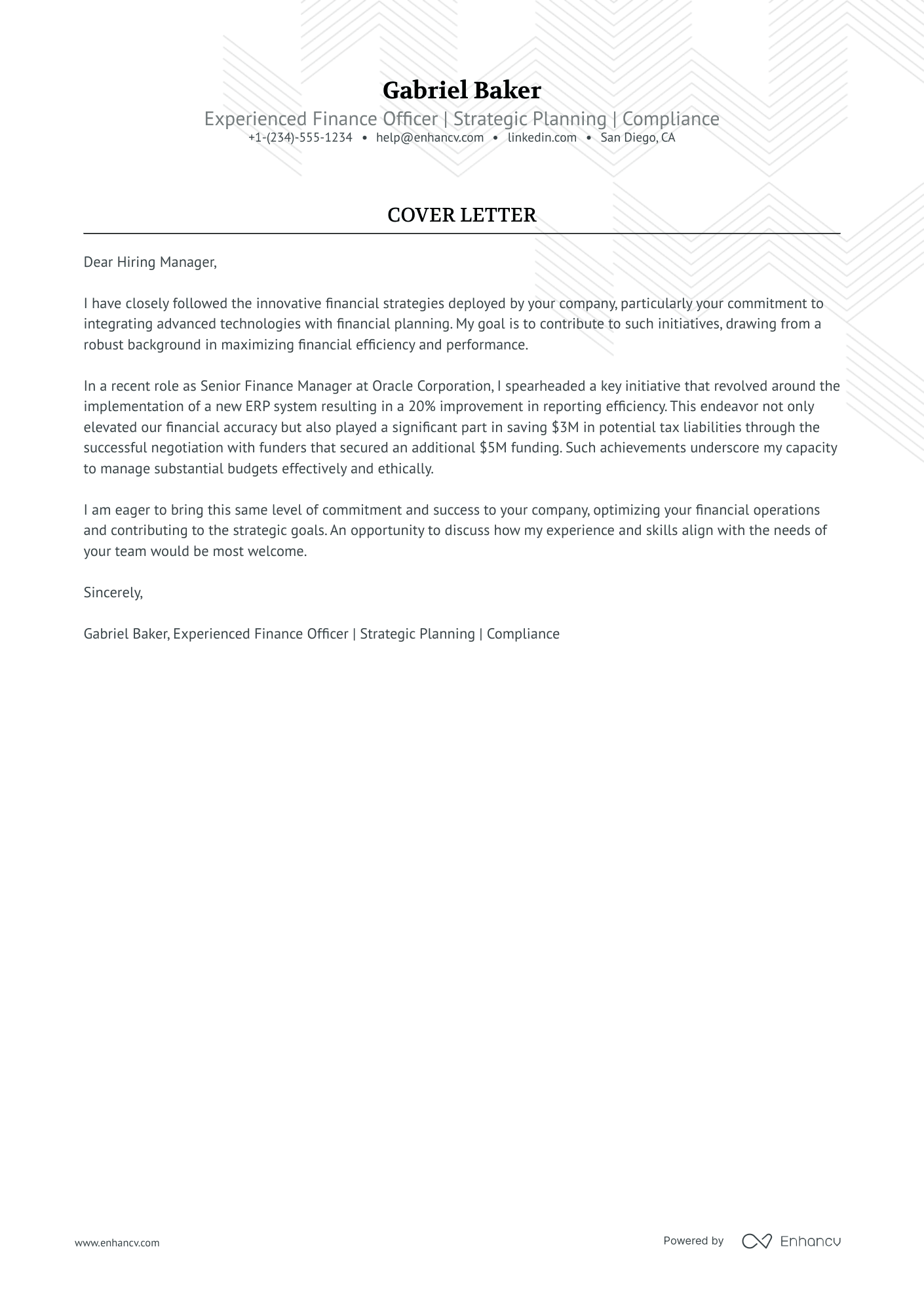As you step into the competitive world of finance, crafting a compelling cover letter can prove vital. It's a familiar scenario: you're applying for a finance manager position, and you realize, a standout cover letter is required. Beyond your resume, it's a space to narrate your proudest professional achievement. It has to be formal yet devoid of overused phrases, succinct within a single page. Let's unlock the secrets to creating a cover letter that resonates with your individual success story.
- Create a finance manager cover letter to persuade the recruiters you're the best candidate for the role;
- Use industry-leading finance manager cover letter templates and examples to save time;
- Dedicate your finance manager cover letter space to your best achievement;
- Make sure your finance manager cover letter meets recruiters' expectations and standards.
Avoid starting at the blank page for hours by using Enhancv's AI - just upload your resume and your finance manager cover letter will be ready for you to (tweak and) submit for your dream job.
If the finance manager isn't exactly the one you're looking for we have a plethora of cover letter examples for jobs like this one:
Drop your resume here or choose a file.
PDF & DOCX only. Max 2MB file size.
Finance manager cover letter example
Michelle Sanders
London, UK
+1-(234)-555-1234
help@enhancv.com
- Tailoring to the Company: The cover letter begins with a strong opening that demonstrates a clear understanding and appreciation of the company's mission and values, particularly regarding financial integrity and innovation.
- Quantifiable Achievements: The candidate effectively showcases her achievements at previous employment by providing specific and quantifiable results, such as reducing aged debtor days, which is a key performance indicator in finance management.
- Technical Expertise: Mentioning experience with a specific financial software like Sage 50 Accounts Professional instantly communicates relevant technical skills and the ability to enhance efficiency through technology – a valuable asset for a Finance Manager role.
- Alignment with Role Requirements: An emphasis on a strategic approach, risk management, and a history of optimizing financial processes aligns closely with the requirements typically expected of a finance manager, thus positioning the applicant as an ideal candidate for the role.
Designing your finance manager cover letter: what is the best format
Let's start with the basics, your finance manager cover letter should include your:
- Header
- Greeting
- Introduction
- Body paragraph
- Closing statement
- Signature (that's not a must)
Next, we'll move to the spacing of your finance manager cover letter, and yes, it should be single-spaced (automatically formatted for you in our cover letter templates).
Don't go for a old-school font (e.g. Arial or Times New Roman), but instead, pick an ATS-favorite like Chivo, Volkhov, or Raleway, to stand out.
Our cover letter builder is also set up for you with the standard one-inch margin, all around the text.
Finally, ensure your finance manager resume and cover letter are in the same font and are submitted in PDF (to keep the formatting in place).
P.S. The Applicant Tracker System (or ATS) won't be assessing your [job] cover letter, it's solely for the recruiters' eyes.
Struggling to find time to write a cover letter? Try our free cover letter generator to create one in just seconds, straight from your resume.
The top sections on a finance manager cover letter
- Header with Contact Information: This includes your name, address, phone number, and email, set out as a professional letterhead, signaling to the recruiter that you're organized and attentive to standard business etiquette.
- Opening Greeting: Address the hiring manager by name if possible, as personalized greetings show you've put extra effort into your research — a crucial skill for a finance manager.
- Introduction: Briefly articulate your relevant experience, such as a record of successful financial strategy implementation, to capture the recruiter's interest by demonstrating your qualifications upfront.
- Body, Highlighting Relevant Skills and Achievements: Expand on your accomplishments with specific examples, like managing budgets or improving ROI, and align them with the job description, showcasing your capability to fulfill the role effectively.
- Closing and Call to Action: Affirm your enthusiasm for the opportunity to contribute to the company’s financial success and politely prompt the recruiter to schedule an interview, showing your proactive attitude that's essential for a finance manager.
Key qualities recruiters search for in a candidate’s cover letter
- In-depth understanding of financial regulations and compliance: This ensures the finance manager can navigate and adhere to complex legal and regulatory environments effectively.
- Robust analytical and strategic thinking skills: To analyze financial data accurately and develop strategies that align with the company's goals.
- Proven experience in financial forecasting and budgeting: Critical for planning and guiding the financial direction of the company.
- Strong leadership and team management abilities: Essential for overseeing the finance team and collaborating with other departments.
- Excellent communication and interpersonal skills: Important for explaining complex financial information to non-financial colleagues and stakeholders.
- Proficiency in financial software and tools: Necessary for efficient handling of financial transactions, reporting, and data analysis.
How to address hiring managers in your finance manager cover letter greeting
Goodbye, "Dear Sir/Madam" or "To whom it may concern!"
The salutation of your finance manager cover letter is how you kick off your professional communication with the hiring managers.
And you want it to start off a bit more personalized and tailored, to catch the recruiters' attention.
Take the time to find out who's recruiting for the role (via LinkedIn or the company page).
If you have previously chatted or emailed the hiring managers, address them on a first or last name basis.
The alternative is a "Dear HR team" or "Dear Hiring Manger", but remember that a "Dear Ms. Simmons" or "Dear Simon," could get you farther ahead than an impersonal greeting.
List of salutations you can use
- Dear Hiring Manager,
- Dear [Company Name] Team,
- Dear [Department] Director,
- Dear Mr./Ms. [Last Name],
- Dear [Job Title] Search Committee,
What to include in those first two sentences, or your finance manager cover letter introduction
Have you ever wondered what the best way is to present your profile in the finance manager cover letter introduction?
There's no right or wrong answer if you're being concise and authentic to yourself.
Some professionals start their finance manager cover letter by:
- congratulating the company - focusing on something impressive, whether that's an award, an industry-leading project, or a key event;
- aligning their passion for the field or industry with the job - if you're enthusiastic about what you do, you'd thus grow your skill set and value as a professional.
That one achievement in your finance manager cover letter body
The lengthiest part of your finance manager cover letter is the body.
Within the next three to six middle paragraphs, present yourself as the best candidate for the role.
How can you do that without retelling your whole professional resume?
Select one key achievement that covers job-crucial skills and technologies (and is memorable).
Within the body of your finance manager cover letter, aim to tell the story of how you achieved your success. Also, write about how this would help out your potential team.
Thinking about the closing paragraph of your finance manager cover letter
Before your signature, you have extra space to close off your finance manager cover letter.
Use it to either make a promise or look to the future.
Remind recruiters how invaluable of a candidate you are by showing what you plan to achieve in the role.
Also, note your availability for a potential next meeting (in person or over the telephone).
By showing recruiters that you're thinking about the future, you'd come off as both interested in the opportunity and responsible.
Which story should you tell in your finance manager cover letter when you have zero experience
Candidates, lacking professional experience in the field - this one is for you.
Your finance manager cover letter is an exercise of integrity, honesty, and, above all, spinning a positive narrative around your strengths.
And what better way to capture recruiters' attention than with your most job-relevant achievement (this could be from your internship or volunteering experience)?
Make sure to back up your success with transferrable skills that are relevant to the job (e.g. how your year, studying abroad, has taught you to be more motivated and handle multicultural environments).
Another safe card you can bet on is your career dream: in the body of your finance manager cover letter, go into the details of how your ambitions would help make the company you're applying for better.
Key takeaways
Turning your finance manager cover letter into a success is all about staying authentic to yourself and relevant to the job:
- Be creative with your finance manager cover letter introduction by stating something you enjoy about the company (that is genuine) or about your skill set (to get the recruiters' interested);
- Use single spacing and have a one-inch margin wrapping all around the content of your finance manager cover letter;
- Select just one past achievement from your career or life to tell a story of how you've obtained job-crucial skills and how they'd be beneficial to the role;
- The finishing paragraph of your finance manager cover letter doesn't necessarily have to be a signature but could be a promise of what you plan to achieve in the role;
- Instead of focusing on your lack of experience, spotlight your transferable skills, one relevant achievement, and career dreams.
Finance Manager cover letter examples
By Experience
Senior Finance Manager
By Role
